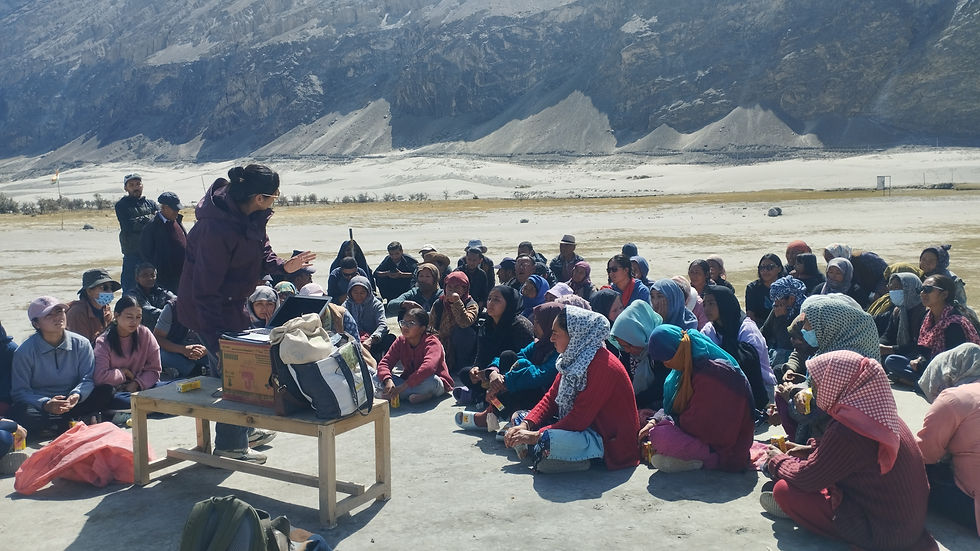
Zero Waste Period
Menstrual cups for better hygiene and waste reduction

55+
Awareness camps held
1300+
Participants
50+
Villages covered
Background
Studies have shown that period pads contain up to 90% plastic and a number of chemicals to attain absorbency, fragrance and whiter appearance. An average woman menstruates for nearly 40 years of her life and uses about 20 pads per cycle subjecting herself to prolonged exposure to toxins and generating a substantial amount of menstrual waste.
In Ladakh, pads are the most commonly used menstrual products and they are disposed of by burning or burying them in the grounds. The recurring cost of purchasing pads is unaffordable for many women. Reusable pads and period underwear are not practical due to water shortage and the extreme cold climate. Menstrual hygiene products are also not readily accessible to everyone due to remoteness.
Objective
The Zero Waste Period programme aims to reduce menstrual waste in Ladakh by empowering women with information on reusable period cups and provide them access to cups at subsidised costs. We collaborate with local authorities to reach out to women in rural areas by organising awareness camps.
Activities
We pitched the project to local authorities who helped us prepare the outreach roster on the basis of Blocks and Panchayats. In collaboration with each of the Block Development Officers and the Sarpanch (village head), we scheduled the awareness camps village by village. At the awareness camp, we provide education about the biological process of menstruation and the harmful effects of pads on our health and the environment. We spread awareness about the menstrual cup as a hygienic and environment-friendly alternative and sell menstrual cups on the spot.
Impact
Our programme has received fantastic response as it addresses the neglected issues of menstrual hygiene and menstrual waste. In 2023, awareness camps were held in 50 villages and attended by 1300 women. During the awareness camps, we sold 1200 menstrual cups at 1.2 USD each, which helped us cover the cost of running the camps.
The Way Forward
We plan to conduct awareness camps in all 142 villages as well as cover the schools and colleges in the region. We envision a Ladakh where menstrual waste management is no longer an issue.
Map
Map showing 50 villages in Leh District of Ladakh, covered under the Zero Waste Period project in 2023.

Gallery
References
-
Sanitary waste management in India: Challenges and agenda, https://www.cseindia.org/sanitary-waste-management-in-india-challenges-and-agenda-11282
-
Landscape of menstrual products in India, https://www.wateraid.org/in/sites/g/files/jkxoof336/files/2022-03/Designed%20Version%20-%20Menstrual%20Product%20Landscape.pdf
-
Wrapped in secrecy: Toxic chemicals in menstrual products, https://ruralindiaonline.org/en/library/resource/wrapped-in-secrecy-toxic-chemicals-in-menstrual-products/
-
Menstrual hygiene management: Informed product choice and disposal, https://www.wateraid.org/in/sites/g/files/jkxoof336/files/informed-product-choice-and-disposal_1.pdf
-
Menstrual waste management, https://www.wateraid.org/in/sites/g/files/jkxoof336/files/menstrual-waste-management.pdf
-
Menstrual products and their disposal, https://toxicslink.org/wp-content/uploads/2022/08/Menstrual%20Waste%20Report.pdf



